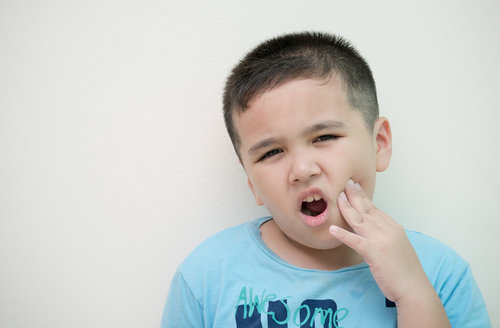We’ve talked about the differences between sensitive teeth in children versus adult teeth sensitivity in past articles. We want to expound on the subject and include some new causes.
Think of how uncomfortable it would be to place an ice cube on a sensitive part of your tooth. It would cause an immediate but passing sensitivity as soon as the ice cube was removed from the tooth. If, on the other hand, you were to wake up with a tooth that was bothering you – and that discomfort continued throughout the day – or, if each bite of every meal caused discomfort, you would likely refer to these instances as a “pain” or a “soreness.” Placing your child in these scenarios will help you decide what they’re actually feeling, and what cause of action to take.
As we’ve previously stated, the most common cause for your child’s sensitivity is either a cavity or the eruption of a permanent tooth. Here are a few of the top reasons why your child may have sensitive teeth:
What Causes Sensitive Teeth in Children?
- Cavities: Since children don’t typically experience sensitivity due to years of improper brushing, the most common reason your child will complain of sensitivity will be due to the presence of a cavity.
- New teeth: Once your child’s teeth have erupted and begin to rise to their proper height, that newfound exposure to air and food can cause some sensitivity. In contrast, the actual eruption of the tooth is more likely to cause pain and soreness.
- A crack or break in the tooth: If a child has a misaligned bite, or tends to grind their teeth at night, they can end up with hairline cracks that can cause pain or sensitivity when eating.
- Fillings: Children with silver amalgam fillings might experience hot/cold sensitivity because of the metal’s high thermal conductivity.
- Sinus problems: Sometimes children with allergies and sinus problems can experience tooth sensitivity, particularly in their upper molars. However, if discomfort in the tooth is present when tapped, the problem is more likely to be with the tooth itself, and not related to sinus issues.
- Improper brushing: While it’s true your child is unlikely to experience sensitivity because of improper brushing, it is possible. Learning proper brushing technique early-on can help your child reduce the risk of this type of sensitivity. Teach your child to use a soft circular motion as opposed to a rapid back and forth motion. This will help preserve the tooth’s enamel which, in turn, protects the nerve-rich dentin. Exposed dentin is what causes this kind of sensitivity. If your child has braces, the technique is even more important. The reason for this is that a child with braces tends to inadvertently brush “lower” along the gum line then they are aware. If they are doing so at a rapid pace, and in a back’ and’forth motion, they’re likely to affect the integrity of the gum line and can set themselves up for later tooth sensitivity.
- Autism: In some cases, it might seem as though your child has sensitive teeth, but it is really he who is sensitive. For example, Autism Speaks (PDF) explains how children with autism tend to be sensitive to strong smells or tastes and might react when you try to brush their teeth or when it’s time to visit the dentist.
If your child is experiencing sensitivity in their teeth, call us at 918.455.7700. Drs. James and Samuel Owens can determine the root cause of your child’s tooth angsts.


Recent Comments